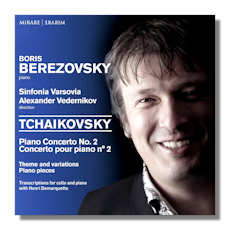
The Internet's Premier Classical Music Source
Related Links
- Tchaikovsky Reviews
- Latest Reviews
- More Reviews
-
By Composer
-
Collections
DVD & Blu-ray
Books
Concert Reviews
Articles/Interviews
Software
Audio
Search Amazon
Recommended Links
Site News
 CD Review
CD Review
Piotr Ilyitch Tchaikovsky

- Piano Concerto #2 in G Major, Op. 44
- Theme & Variations, Op. 19 #6
- Pieces for Piano, Op. 40 #2,5,6,7,8
- Valse sentimentale, Op. 51 #6 *
- Andante cantabile, from String Quartet, Op. 11 *
Boris Berezovsky, piano
* Henri Demarquette, cello
Sinfonia Varsovia/Alexander Vedernikov
Mirare 200 DDD 72m
Unlike its ubiquitous predecessor, Tchaikovsky's Second Piano Concerto (1880) never achieved much popularity. It's a brilliant, at times fiendishly difficult, and optimistic work (especially for Tchaikovsky), but from the beginning its length was criticized, just as much as its most original feature, the lyrical Andante non troppo which the composer transformed into a sort of triple concerto for violin, cello and piano – contemporary to Brahms's Second Piano Concerto. Curiously, while some pianists like Emil Gilels and Shura Cherkassky made performing the G Major into something of a specialty, others who left their mark on the First Concerto ignored it completely (Sviatoslav Richter, Vladimir Horowitz, Martha Argerich, among others). The Second Concerto was virtually always recorded in its heavily abridged version published posthumously by pianist Alexander Siloti – and containing edits Tchaikovsky never approved of. The most drastic cuts precisely affect the Andante non troppo. It wasn't before the mid-1980s (thanks to pianists like Viktoria Postnikova and Peter Donohoe) that the original, uncut version became part of standard recording practice.
In this new disc Russian pianist Boris Berezovsky quite naturally performs the original version. Recorded in concert in Warsaw it has all the raw excitement of a live gig – including audience noises. Berezovsky attacks the outer movements with his well-known ferocious energy, but also without the least bit of heaviness. The visceral punch of his playing, often at breakneck speed yet impeccably controlled, is undeniable and Berezovsky is audibly relishing the long solo stretches that Tchaikovsky has in store for him. The Sinfonia Varsovia under Alexander Vedernikov keep up as best as they can. There have been more nuanced and more dramatic readings (Gilels remains in this respect unsurpassed), even if Berezovsky has both the strength and stamina in spades to sell his approach to the very end. He only seems willing to settle down during the Andante non troppo, where the orchestra finally can take the lead and the three soloists engage in this beautiful chamber music-like conversation which needs to be heard in its complete form. Jakub Haufa (violin) and Marcel Markowski (cello) prove sensitive partners. The final movement is tremendous fun with Berezovsky taking the con fuoco notation to the letter and unleashing an unstoppable forward impetus (yet without ever giving in on articulation), which has the audience loudly cheering its approval.
To complete this generous disc, Berezovsky shows a different side of Tchaikovsky (and of himself) with an interesting selection of piano solo music (taken from the Twelve Pieces, Op. 40 and the Theme and Variations, Op. 19/6) and two ravishing transcriptions for cello and piano of the Valse sentimentale, Op. 51/6 (transcribed by Viktor Kubatsky) and the famous Andante cantabile from the First String Quartet, Op. 11 (transcribed by David Geringas). The recording here (at the Paris Salle Gaveau in studio conditions) is much preferable to the rather indifferent and monochrome sonics from the Warsaw concert.
Tchaikovsky's substantial solo piano output remains all in all little known and albeit less consistent than some, you're certain to find a gem around each corner. The selection of the Op. 40 pieces is played with tremendous flair by Berezovsky, making you regret he didn't record the whole set. He includes the riveting, folk-inspired In the village, as well as the elegant first Waltz. His dynamism is still apparent (as in the substantial Theme and Variations), but he also knows when to let the music breathe. He is joined by the glowing cello of Frenchman Henri Demarquette for the last two transcriptions, ending this disc in simple beauty and tenderness, and reminding us once again why it is so difficult not to love Tchaikovsky. Recommended.
Copyright © 2013, Marc Haegeman


















